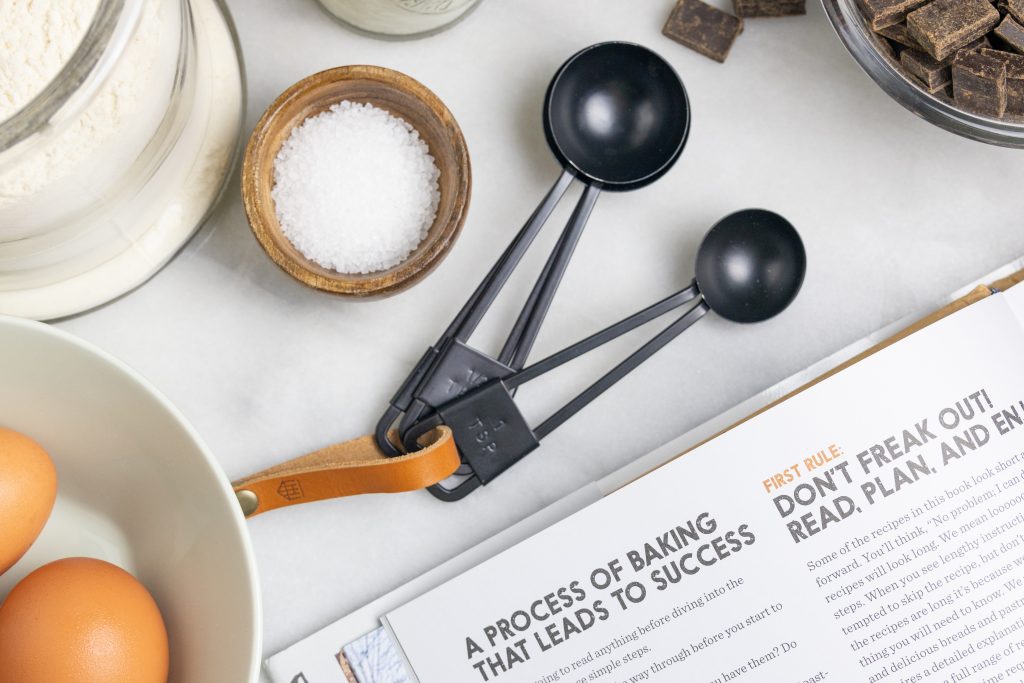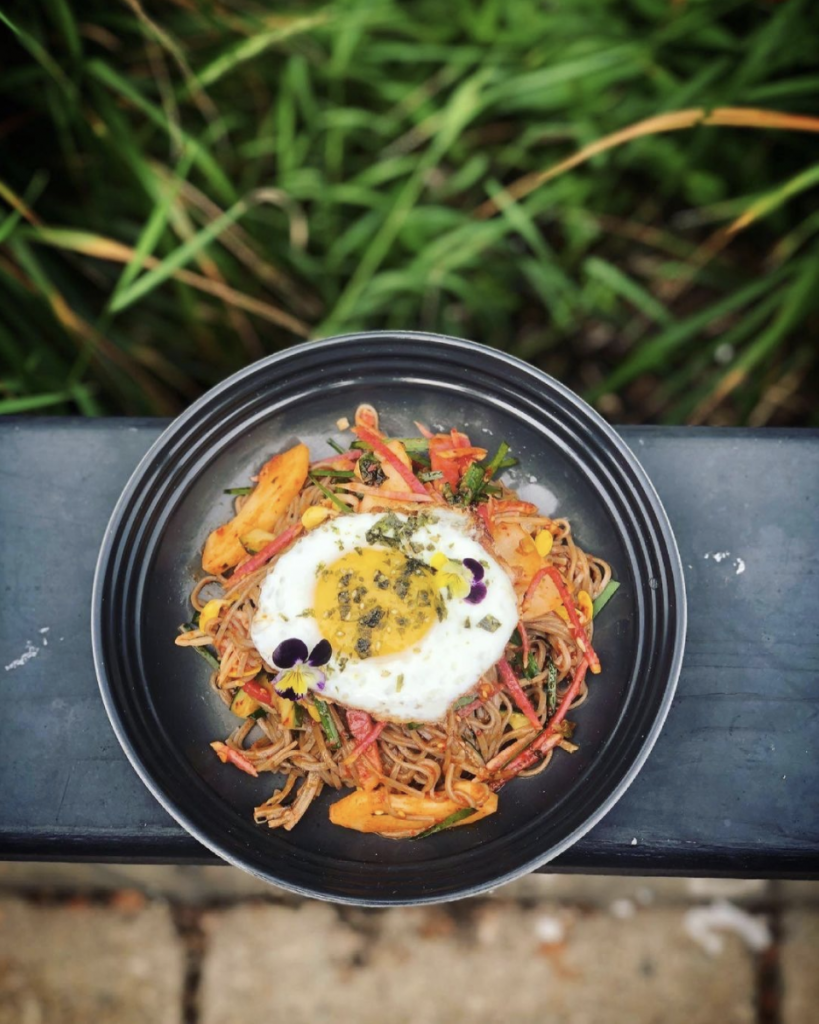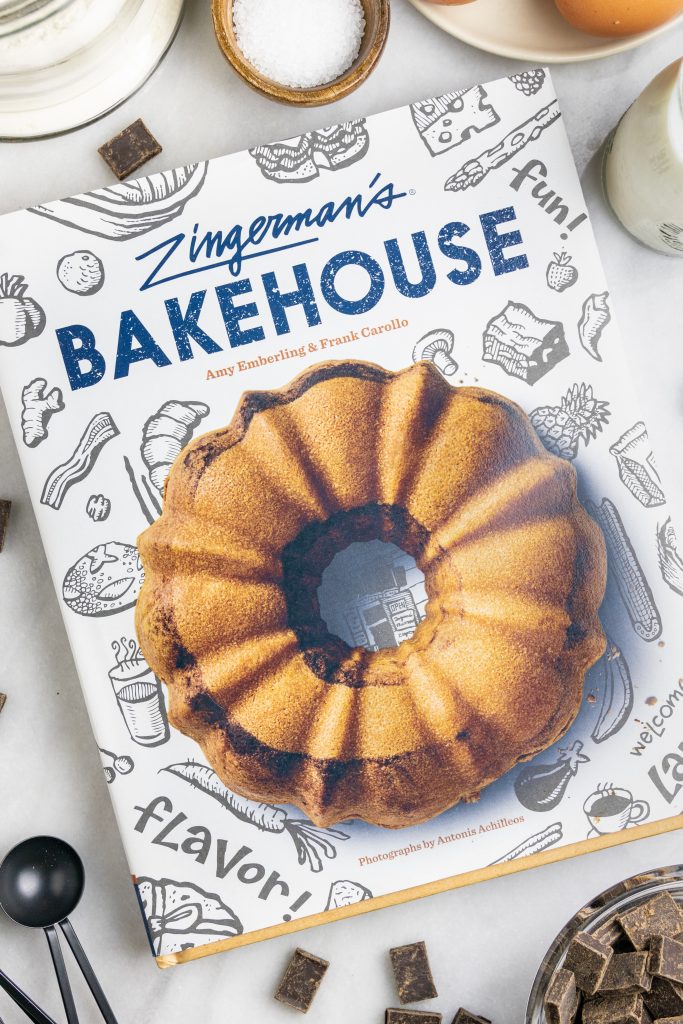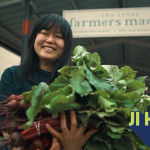We’ve missed bringing in special guests to BAKE! in-person, so, throughout this year, as things get back to normal, we’re bringing chefs, authors, and friends of the Bakehouse to your kitchens as they put their own spin on one of the recipes found in our cookbook or cookbooklets (or share thoughts on our cookbook, as is the case this month!).
This month, we’re welcoming Ji Hye Kim, the chef and managing partner of Miss Kim, a Korean restaurant greatly influenced by Korean ancestors and Michigan farmers and part of the Zingerman’s Community of Businesses:
I’m not much of a baker. I’m not even a “classically trained” chef either, not in the Western, French-centric way anyway. Not all of my cooks are Korean, Korean-American, Asian-American, or have trained in Asian kitchens before.

I had a lot of fun reading through Zingerman’s Bakehouse cookbook. Since I’m not a baker in any sense of that word, my pleasure was sort of a tourist-kind of joy, a bit removed from my day-to-day existence. Except for one particular section. It is the part titled, “Most Common Baking Mistakes,” and lists the following mistakes:
- Not enough color
- Changing the recipe the first time through
- Changing more than one variable at a time
- Not measuring properly
- Not having the right ingredients and substituting
- Using a different pan size and not adjusting the baking time
- Incorrect oven temperature
It sort of hit me how similar these common mistakes are in a Korean kitchen too.

Occasionally people ask me if I only hire Korean cooks. I generally laugh and answer that hiring only Korean cooks would be against the law, because it would be considered discrimination. And I think by now we’ve heard how hard it has been to find good cooks, especially coming out of the pandemic. I simply do not have the option of only hiring a cook of Korean descent, or even hiring cooks with experience in Korean cooking. What I can and have been doing with pretty good results is to hire cooks with some experience, and to train them to avoid similar mistakes as listed in the “Most Common Baking Mistakes” section.
One example is how we write our recipes.
Most savory kitchens have their recipes in volume, in English system (ounces, pints, gallons, etc). Not Miss Kim’s kitchen. Our recipes are in weight, measured out in the Metric system (grams!). It’s partially because I myself was so confused about fluid ounces, regular ounces, quarts, and wait….how many pints are in a gallon, and how many teaspoons are in a tablespoon? There are 3 teaspoons in 1 tablespoon, 16 tablespoons in 1 cup, 2 cups in 1 pint, 2 pints in 1 quart, 4 quarts in 1 gallon, and so 128 ounces in 1 gallon…..so if I want to triple this recipe, how does the math go?
It is also because I needed to build a collection of recipes with less room for error.
If I’m confused, then other cooks will be confused, and with all the different numbers being multiplied, there are bound to be mistakes. I have cooks without much Korean food experience, so the recipes need to be easy to follow and easy to be accurate to ensure consistency. So when I read “not measuring properly,” I thought, yes, I can relate to that.
And there’s “changing more than one variable at a time” coupled with “not  having the right ingredients and substituting.”
having the right ingredients and substituting.”
Michigan is not necessarily the center of the supply chain for Korean ingredients. More diverse Korean ingredients come into New York and LA, but don’t necessarily make it to the middle of the country. Sometimes we find ourselves needing to update a recipe because the brand of soy sauce that we built our recipes on is not available and we have a different soy sauce with maybe different levels of salinity or acidity or sweetness. Then we start carefully tweaking our recipes—if we changed more than one ingredient at a time, we would not know what worked and how to adjust and produce a consistent result every time.
Sometimes I’d get an enthusiastic cook wanting to change our recipes and dishes. But having a clear understanding of the basics and the baseline standard needs to come first, before we can make meaningful changes. So the mistake of “changing the recipe the first time through” rang especially true in our kitchen too.
I can go on and on about all the other ones, but the point is this. The most common baking mistakes and the lessons we can learn from them translate well into savory cooking. Amy and Frank are wise! We should all listen to the lessons from the Bakehouse and we will have better food, no matter whether we are baking or roasting and braising.
HUNGRY FOR MORE?
- Order from Miss Kim for takeout or local delivery
- Follow Miss Kim on Instagram
- Get Miss Kim’s recipes for pickled vegetables and kimchi
- Check out last month’s edition in this series, Savory Bread Pudding with Bacon, Tomato & Spinach

Ji Hye Kim
Ji Hye Kim is the chef and managing partner of MISS KIM, a Korean restaurant greatly influenced by Korean ancestors and Michigan farmers. Miss Kim is a part of the Zingerman’s Community of Businesses in Ann Arbor, MI, famed as much for its fair values and innovative business practices as for its full-flavored artisanal food. Miss Kim’s food is simple and good, with the menu dictated by seasonality and locality as Korean culinary tradition dictates.
After graduating from the University of Michigan and a successful career in hospital administration, Ji Hye switched to the hospitality industry in 2008. Having trained at various Zingerman’s businesses and Rome Sustainable Food Project, she then went on running an Asian street food cart for 4 years before opening a brick and mortar location in 2016. As well as providing convivial service and delicious food, Miss Kim has been committed to doing away with tipped credit and paying a fair wage to all staff since opening.
Ji Hye is a semi-finalist for the James Beard Award Best Chef Great Lakes in 2020. In the middle of the COVID-19 pandemic and as independent restaurants across the country are at risk, she was admitted to and participated in the James Beard Chef Boot Camp for Policy Change and Food Lab Detroit’s Fellowship for Change in Food and Labor. She believes that service is an honorable profession and envisions a more delectable, sustainable, and equitable future for the industry.
